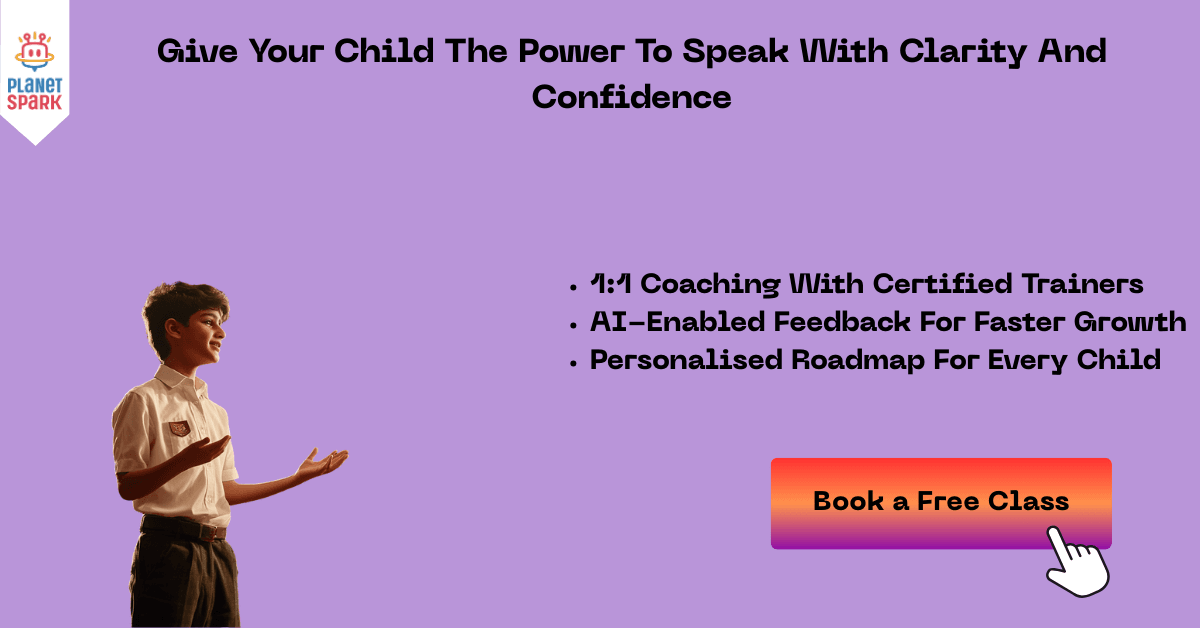Economy and Work Speech Topics for Class 3 Students
Last Updated At: 20 Aug 2025
11 min read

In today’s fast-paced and competitive world, children need more than just academic knowledge; they need practical life skills. While subjects like Science and Mathematics sharpen logical reasoning, it is equally important for kids to understand how the economy works and why hard work matters in everyday life. Introducing concepts like money management, demand and supply, and the importance of work at an early stage allows children to develop a sense of responsibility and awareness that will help them throughout their lives. Class 3 is an ideal time to start, as children are curious, eager to learn, and capable of grasping these foundational principles.
At PlanetSpark, we believe that public speaking is one of the best ways to nurture such understanding. Through PlanetSpark’s Public Speaking Courses, children don’t just learn communication; they learn how to express ideas about real-world topics like the economy and work with clarity and confidence. With the help of 1:1 coaching, AI-driven tools, and gamified learning methods, kids develop fluency, confidence, and creativity while mastering topics that truly matter. Encouraging children to give speeches on the economy and work fosters not only public speaking skills but also real-life awareness about money, effort, and success.
Why Teach Economy and Work Principles to Class 3 Students?
Many adults assume that children are too young to understand how the economy functions or why work matters. This is a misconception. In reality, children are keen observers of the world around them. They notice when parents budget, when prices increase, or when someone works hard to achieve success. Giving them age-appropriate exposure to these ideas helps them become financially literate and value-driven individuals.
By introducing speech topics on the economy and work, we encourage kids to think critically, organise their thoughts, and speak confidently in front of others. This practice doesn’t just build knowledge, it develops communication, leadership, and problem-solving skills that go far beyond the classroom.

Economy and Work Speech Topics with Sample Speeches for Class 3
1. Why Is Money Important in the World?
Money is something we all use every day. Without money, it would be very hard to buy food, clothes, or toys. A long time ago, people used to exchange things like rice for salt, but that was not always fair or easy. Money makes it simple to buy what we need. It helps us go to school, travel, and even enjoy small treats like ice cream. That is why money is so important. It gives us comfort and helps us live a better life.
2. Why Should You Save Money?
Saving money is like planting a seed. When you save, the small coins or notes you put away today will grow into something bigger tomorrow. If we spend all our pocket money quickly, we may not have anything left for something important later. Savings can help us buy school supplies, gifts for our loved ones, or even something special we really want. Saving money teaches us to be careful and responsible.
3. How to Manage Money Efficiently?
Managing money means using it wisely. First, we should spend only on things we truly need, like books and food, before buying toys or chocolates. Second, we should make a small plan on how much money to spend and how much to save. Third, we should avoid wasting money on unnecessary things. By managing money efficiently, we can make sure it lasts longer and helps us when we need it most.
4. How to Save Money?
Saving money is easy if we make small efforts. We can use a piggy bank to collect coins every week. We can also save by not wasting electricity or water, because saving resources saves money, too. Another way is to spend less on things we don’t really need and keep some money aside for the future. Saving money helps us prepare for bigger needs later in life.
5. Benefits of Growing Your Food
Growing food at home is very useful. If we plant vegetables like tomatoes or spinach, we can eat fresh, healthy meals without buying them from the market. This saves money and keeps us healthy. Gardening also teaches us patience, care, and hard work. The food we grow with our own hands always tastes special because it comes with love and effort.
6. The Effects of Demand and Supply on Price
Have you ever noticed that toys become more expensive during festivals? This is because more people want them, and shops raise the prices. That is called demand and supply. When demand is high, prices go up. When demand is low, prices go down. Understanding this helps us know why sometimes things cost more and sometimes less.
7. What Can Children Do for the Growth of the Economy?
Even children can help the economy grow. We can study well and prepare for good jobs in the future. We can support local products, recycle, and not waste food. We can also help our parents save money and be responsible with what we have. Small actions by children today can create a big impact on tomorrow’s economy.
8. Story of the Economy of the Country
Every country has its economy, which grows when people work hard, produce goods, and trade with others. India, for example, has grown stronger because of its farmers, industries, and technology experts. The story of our economy shows us how teamwork and hard work help a country become powerful and successful.
9. Factors Affecting Economic Growth
There are many factors that affect how a country grows. Education helps people get better jobs. Good health allows people to work harder. Technology makes life easier and faster. If these things improve, the economy of a country becomes strong. That’s why we should focus on learning, staying healthy, and using new ideas.
10. Home Economics
Economics is not just for big businesses; it starts at home. When our parents plan how much to spend on food, school, and savings, they are doing home economics. Even children can help by not wasting things and learning how to use money carefully. This teaches us responsibility.
11. Importance of Budgeting in the Home
Budgeting means making a plan for money. At home, parents budget money for school fees, groceries, and savings. Without a budget, money can get wasted. Children can also make small budgets for pocket money, spending some, saving some, and planning for future needs. Budgeting keeps everything organised.
12. Why Shouldn’t You Waste Food?
Food is precious, and many people in the world don’t get enough of it. When we waste food, we waste money and resources too. By eating only what we need and saving leftovers, we can stop waste. Respecting food means respecting the farmers and workers who worked hard to produce it.
13. The Importance of Work
Work gives people purpose and dignity. Farmers grow crops, teachers educate students, and doctors heal patients. Every kind of work is valuable. Without work, life would stop moving forward. That’s why we should always respect people’s jobs and value the importance of work.
14. Why Is Hard Work Important for Children?
Children need to understand the value of hard work early in life. Whether it is finishing homework, practising sports, or learning new skills, hard work makes us better every day. Success doesn’t come overnight; it comes from steady effort.
15. The Relation Between Hard Work and Success
Hard work and success are best friends. If we don’t work hard, success will never come. For example, if a student studies regularly, they will perform well in exams. The same rule applies in sports, arts, or any activity. Success is always built on hard work.
16. Why Is Education Important for Economic Growth?
Education teaches people how to think, create, and work. When children study well, they grow into adults who can contribute to the economy. Doctors, engineers, teachers, and scientists are all educated people who help the country grow. Education is the key to development.
17. Why and How Should Children Learn Time Management?
Time management means using time wisely. Children can learn it by making timetables, finishing homework before play, and not wasting hours on unnecessary activities. Time management helps us balance study, play, and rest. Learning it early makes life easier.
Transform stage fear into stage power. Join PlanetSpark’s Public Speaking Free Trial Session now.
18. Time Is Precious – Here’s Why
Time is something we can never get back once it is gone. If we waste time today, we may regret it tomorrow. That is why we should use every minute to learn, play, or do something meaningful. Time is precious and should never be wasted.
19. Benefits of Developing Problem-Solving Skills at a Young Age
Problem-solving helps us face challenges. When a toy breaks, we can try to fix it instead of crying. When we face tough questions in class, solving them makes us smarter. Learning problem-solving at a young age makes us confident and ready for the future.
20. Why Are Some People Unemployed?
Unemployment means people don’t have jobs. This happens when people don’t have enough skills or when there are not enough opportunities. That’s why education and training are important. If everyone learns well and works hard, fewer people will be unemployed.

21. Why Are Health and Hygiene Important for the Growth of the Economy?
Healthy people can work better and longer. If people are sick, they can’t go to work, and the economy slows down. Simple habits like washing hands, eating healthy food, and staying clean keep us strong and productive. Health and hygiene are important for everyone’s success.
22. What to Eat to Stay Healthy?
To stay healthy, we should eat a balanced diet. This includes vegetables, fruits, milk, grains, and nuts. Eating too much junk food makes us weak, while healthy food gives us energy to study, play, and grow. A healthy child becomes a strong adult who can contribute to society.
Start your child’s journey to becoming a confident communicator. Sign up for a Free Trial Class.
How PlanetSpark Public Speaking Courses Help Students
Public speaking is one of the most effective ways to make children comfortable with complex topics like the economy and work. PlanetSpark’s Public Speaking Courses combine personalised coaching, technology-driven tools, and interactive learning methods that empower kids to express themselves confidently.
Key Features of PlanetSpark Courses:
1:1 coaching with certified trainers.
Personalised learning roadmap for each child.
SparkX AI video analysis tool for feedback.
AI-led practice sessions for storytelling and speeches.
Spark Diary for daily writing habits.
Gamified modules like Grammar Guru and Spell Knockout.
Parent-Teacher Meetings and detailed progress reports.
Clubs and communities like Debate, Story Writing, and Podcasting.
Sparkline, a safe content-sharing platform.
SparkBee quizzes and SparkShop eBooks for daily practice.
Regular contests and showcases for recognition.
Conclusion
Work and economy are not abstract concepts; they’re a part of daily life. Teaching children about these topics early helps them value money, appreciate hard work, and understand how society functions. Encouraging speeches on these topics not only strengthen their knowledge but also build essential communication skills.
Through PlanetSpark’s Public Speaking Courses, kids don’t just memorise speeches; they learn to express their ideas with clarity, confidence, and creativity. With 1:1 coaching, AI-enabled feedback, gamified learning, and vibrant communities, children transform into confident speakers and thoughtful individuals who are ready to thrive in the real world.
FAQs
1. Why should Class 3 students learn about the economy and work?
It helps them understand money, savings, and the importance of hard work early in life.
2. How do speeches help children learn better?
Speech practice improves confidence, clarity of thought, and communication skills while reinforcing knowledge.
3. What makes PlanetSpark’s Public Speaking Courses unique?
Personalised 1:1 coaching, AI-driven analysis, gamified tools, and engaging communities make learning highly effective.
4. Can children understand topics like demand and supply?
Yes. With simple real-life examples like toy prices rising during festivals, children can grasp these ideas easily.
5. How does PlanetSpark track progress?
Through detailed progress reports, AI video analysis, and regular parent-teacher meetings.
6. Are PlanetSpark’s courses only about public speaking?
No. They also cover storytelling, creative writing, grammar, vocabulary, and confidence-building activities.
7. How do parents stay involved in the learning process?
Parents receive regular updates, progress reports, and can join structured PTMs to stay aligned with their child’s journey.
Recommended Tests
Personalized Communication Report
Record a video to get a AI generated personalized communication report for your child
Select Learner's Class
